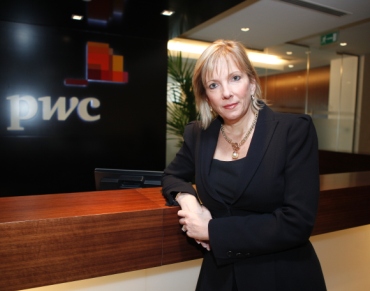As PwC rolls out its Mini-MBA, Joyce Njeri speaks with the Course Director Amanda Line, to find out more about the programme’s offering…

CREATING AN EDGE: “Through the network of PwC’s Academies we continually exchange best practices and successful methodologies to ensure that we are consistently providing industry leading training programmes.”
Q. Congratulations on the launch of PwC’s Mini MBA programme that commenced on the 20th of April in Abu Dhabi. What is special about this location that you selected it as your first launch site?
Thank you, we are very proud of our initial launch in Abu Dhabi. One of the goals of our Mini MBA programme is to work with Emiratis to help them develop the knowledge and leadership skills needed to guide the UAE forward – we chose to launch in Abu Dhabi because of the strong presence of Nationals in their workforce.
Our key differentiator is our global network of professionals. We are constantly communicating and gathering ideas from our diverse network of industry experts to ensure our courses reflect the needs of modern professionals and organisations. Our objective is to have industry leading experts driving our industry leading professional training. That’s the PwC’s Academy advantage.
Tell us more about PwC’s Academy and your collaboration with the UAE Academy.
PwC’s Academy is the educational business of the global organisation PricewaterhouseCoopers (PwC). Our goal is to give people greater knowledge, competence and expertise in finance and business. Our foundation is our team of expert professionals who convey their wealth of knowledge and the practical experience they have gained within leading organisations around the world.
We offer a variety of training courses covering professional qualifications, financial competencies, and management skills. The courses are based on both the individual experiences of our experts and the best practices of PwC Global. We constantly adapt our courses to meet the needs of modern business and tailor them to our client’s requirements.
PwC’s Academies in the Middle East are part of PwC’s growing network of Academies which are present in over 30 countries worldwide. Through the network of PwC’s Academies we continually exchange best practices and successful methodologies to ensure that we are consistently providing industry leading training programmes.
Our courses are divided into three areas:
- Finance skills & competencies (accounting, financial reporting, financial management, audit, corporate finance, and corporate governance)
- Mini-MBA Programme and Management skills (soft skills)
- International professional qualifications (ACCA, CIA, DipIFR, CIMA Diploma in Performance Measurement (Arabic), CPA, CFA)
Our courses are offered in two formats:
- Open training courses accessible to the public
- Internal training courses customised to individual clients’ needs
Our training courses are continually evolving. We are always open to working with clients to develop new courses to meet their needs and ensure their professional development objectives are met.
In today’s competitive job market, a credential next to one’s name can help their resume stand out. Why is it important for professionals to gain a PwC Mini MBA qualification? What does your programme offer to stand out from the crowd of other training providers?
PwC is a very strong supporter of professional credentials, however in today’s competitive job market simply having a technical competence is not enough to truly create value for your business and clients. Today’s professional must be able to synergise their skills with the overall strategy and vision of the firm.
PwC’s Mini-MBA provides participants with an understanding of all facets of the modern organisation and the interdependence between them. We believe our offering stands out due to the practical focus of the programme. We have taken PwC’s experiences in working with the top businesses’ from all over the world and brought those to the classroom. We felt that too many programmes were doing the opposite and trying to apply theories from the classroom onto the business world.
With your programme launching in Abu Dhabi, you don’t seem to offer a lot of flexibility to students in terms of study location. Would an online degree possibly be the programme structure of the future for PwC’s Mini MBA?
Although the initial launch is in Abu Dhabi we will also be launching the programme in Dubai this fall and then throughout the Middle East. We would be hesitant to launch an online programme as much of the value comes from the interaction between fellow participants and also with our facilitators. Although we never rule anything out, this interaction can be difficult to replicate with an online platform.
As the programme coordinator and Partner at PwC’s Academy what would be your role? Are you teaching any modules? If so, which one(s)?
My initial focus is to ensure that we have the best people possible involved in the programme, However I would love to present the Accounting & Financial Management module in future.
Recently, a number of business schools have begun providing Mini-MBA courses through their distance learning programmes. If your programme proves successful, would you consider to expand your global footprint and maybe launch in other cities in the region? What are your plans for the next five years in terms of programme development and expansion?
Yes we do have plans to expand our footprint. Outside of the UAE, we will look to launch in Qatar as early as this fall with subsequent launches to follow, including Egypt and Kuwait in 2014. Our vision is to have the programme running throughout the Middle East within the next 2-3 years. Additionally we are also looking to develop industry focused Mini-MBA programmes such as oil and gas, financial services, and telecommunications.

BEST PRACTICES: “Educational curriculums must be adjusted but they can never keep pace with the ever changing modern business world.”
Most of Master programmes offered by institutions require work experience from prospective applicants. So, working professionals, fresh students, business starters – Who should take the Mini-MBA Programme? What kind of profile is your programme looking for? On the same note, tell us more about your collaboration with the UAE Academy.
The programme is very practical in nature, providing immediate takeaways for the participants. Thus we feel it is best suited for working professionals and entrepreneurs. Additionally much of the learning is based on the participants own working experience. In rare circumstances we would also accept fresh students if we felt they could add value to the programme.
The UAE Academy has an excellent reputation and track record in their training work. We have worked with them on several training initiatives and have been pleased with the collaboration. With their ties to the Abu Dhabi School of Management we believe it is a good collaboration for the Mini-MBA.
What has been the response regarding enrolment to your programme in the UAE? Kindly give us the exact number of students who have registered to pursue the programme.
Thus far the response has been overwhelmingly positive. Our programme has fulfilled a real demand in the region and the response confirms this. We have closed the programme at 15 participants as we feel this is the ideal number to provide both diversity of experience and ample opportunity for all participants to be intimately involved.
Tell us more about the exams. What are the pre-requisites required for anyone interested in pursuing the Mini-MBA course. What is the certification or license procedure afterwards? Does it read ‘Mini-MBA’?
As this is not an academic MBA we do not have stringent educational or test based pre-requisites. Our focus is based on assuring that participants have suitable working experience. In terms of assessment we use Harvard Business School case studies and provide participants feedback for their future professional growth.
Upon completion we provide all participants with a PwC Mini-MBA certificate of completion. As an industry based Mini-MBA we are not seeking to provide academic credentials.
Some say that the education taught in classrooms is different from the actual on-the-job skills necessary for success. As an educator, do you think there needs to be continuous adjustments in the education curriculum to bridge the gap?
I have spent most of my career in the business of professional education and I’m a strong believer that it is best delivered by those who have the professional experience to enhance the learning. Educational curriculums must be adjusted but they can never keep pace with the ever changing modern business world. I think that the sharing of experiences and best practices from current working professionals can help to bridge the gap. This is the inspiration behind the Mini MBA – bringing the experiences of PwC professionals into the classroom.
Accounting and finance in particular have evolved from their initial traditional functions and developed into a broad field encompassing a number of disciplines including book keeping, auditing, taxation, forensic accounting, new standards etc. When admitting potential students into your Mini-MBA programme, do you really consult with them to understand what their individual needs are in terms of the roles and sectors where they work, in order to tailor their courses accordingly?
We aim to meet with each prospective participant before they begin the programme to ensure that they are suitable and to learn what they hope to take out of the programme. We cannot tailor the curriculum to meet the needs of every participant however we can make adjustments accordingly. For example if some participants are particularly interested in corporate governance we are happy to invite one of our PwC specialists to come speak on the subject. This is the advantage of our extensive network.
We also provide bespoke in house corporate training where we customise the course content to the client needs. We are currently working with several large organisations in the region to adapt our materials to steer the learning outcomes inward towards their own organisation. Thus we adapt specific topics and case studies to reflect the firm’s current situation. This has been extremely popular with firms looking for comprehensive, customised learning solutions for their management teams.












